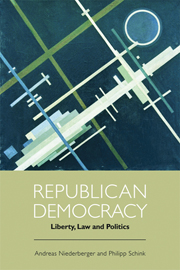Book contents
- Frontmatter
- Contents
- List of contributors
- Introduction
- 1 The Tension between Law and Politics in the Modern Republican Tradition
- 2 Impotence, Perspicuity and the Rule of Law: James Madison's Critique of Republican Legislation
- 3 Kant, Madison and the Problem of Transnational Order: Popular Sovereignty in Multilevel Systems
- 4 Republicanism and Democracy
- 5 Two Views of the City: Republicanism and Law
- 6 A Kantian Republican Conception of Justice as Nondomination
- 7 Two Republican Traditions
- 8 Freedom, Control and the State
- 9 Legal Modes and Democratic Citizens in Republican Theory
- 10 Rights, Republicanism and Democracy
- 11 Republicanism and Global Justice: A Sketch
- 12 Republicanism and Transnational Democracy
- Index
5 - Two Views of the City: Republicanism and Law
Published online by Cambridge University Press: 05 October 2013
- Frontmatter
- Contents
- List of contributors
- Introduction
- 1 The Tension between Law and Politics in the Modern Republican Tradition
- 2 Impotence, Perspicuity and the Rule of Law: James Madison's Critique of Republican Legislation
- 3 Kant, Madison and the Problem of Transnational Order: Popular Sovereignty in Multilevel Systems
- 4 Republicanism and Democracy
- 5 Two Views of the City: Republicanism and Law
- 6 A Kantian Republican Conception of Justice as Nondomination
- 7 Two Republican Traditions
- 8 Freedom, Control and the State
- 9 Legal Modes and Democratic Citizens in Republican Theory
- 10 Rights, Republicanism and Democracy
- 11 Republicanism and Global Justice: A Sketch
- 12 Republicanism and Transnational Democracy
- Index
Summary
Republican political theory has been thought to have distinctive implications for law and especially for constitutional institutions and practices. A republic is supposed to pursue the common interests of its citizens and for that reason republicans have usually opposed rule by narrow groups such as monarchy or oligarchy, which would be tempted to pursue narrower objectives. Traditionally republicans have also usually opposed democracy, too – especially direct democracy of the kind practiced in Athens – on the ground that rule by a majority is a form of despotic or lawless rule. Republicans have also tended to be suspicious of liberalism because of its emphasis on private goods rather than public projects and its deprecation of duties and of shared or public interests. Nowadays, however, many republicans argue that republicanism actually requires a commitment to certain kinds of “democratic” institutions and to deliberative practices, and they see some version of democracy as consistent with assuring robust liberal protections for individual freedom.
Philip Pettit, for example, argues that law, even though it compels and coerces, is or can be emancipative for individuals. By reducing the domination of some by others, it can increase the amount of liberty or freedom enjoyed by the individuals in society. Moreover, he argues that the legal system can be so arranged, constitutionally, as to limit domination by governmental officials while permitting it sufficient power and purpose to restrain private actors from dominating others.
- Type
- Chapter
- Information
- Republican DemocracyLiberty, Law and Politics, pp. 128 - 153Publisher: Edinburgh University PressPrint publication year: 2013



